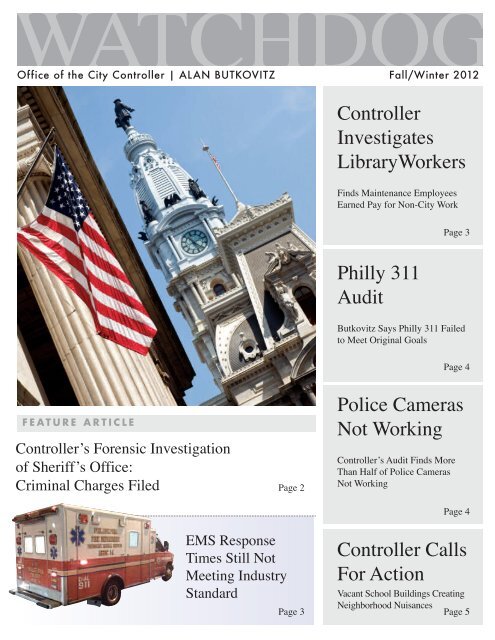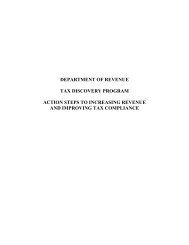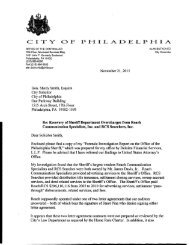Newsletter - Office of the Controller, City of Philadelphia, Controller ...
Newsletter - Office of the Controller, City of Philadelphia, Controller ...
Newsletter - Office of the Controller, City of Philadelphia, Controller ...
You also want an ePaper? Increase the reach of your titles
YUMPU automatically turns print PDFs into web optimized ePapers that Google loves.
<strong>Office</strong> <strong>of</strong> <strong>the</strong> <strong>City</strong> <strong>Controller</strong> | ALAN BUTKOVITZ Fall/Winter 2012<br />
<strong>Controller</strong><br />
Investigates<br />
LibraryWorkers<br />
Finds Maintenance Employees<br />
Earned Pay for Non-<strong>City</strong> Work<br />
Page 3<br />
Philly 311<br />
Audit<br />
Butkovitz Says Philly 311 Failed<br />
to Meet Original Goals<br />
Page 4<br />
F E A T U R E A R T I C L E<br />
<strong>Controller</strong>’s Forensic Investigation<br />
<strong>of</strong> Sheriff’s <strong>Office</strong>:<br />
Criminal Charges Filed<br />
Page 2<br />
Police Cameras<br />
Not Working<br />
<strong>Controller</strong>’s Audit Finds More<br />
Than Half <strong>of</strong> Police Cameras<br />
Not Working<br />
Page 4<br />
EMS Response<br />
Times Still Not<br />
Meeting Industry<br />
Standard<br />
Page 3<br />
<strong>Controller</strong> Calls<br />
For Action<br />
Vacant School Buildings Creating<br />
Neighborhood Nuisances<br />
Page 5
<strong>Controller</strong>’s Forensic Investigation <strong>of</strong> Sheriff’s <strong>Office</strong>:<br />
Criminal Charges Filed<br />
After <strong>the</strong> Sheriff’s <strong>Office</strong> failed to provide<br />
financial records worth $53 million during<br />
a departmental audit, <strong>the</strong> <strong>City</strong> <strong>Controller</strong><br />
launched a precedent forensic investigation<br />
that uncovered numerous questionable<br />
financial transactions and fraudulent activity<br />
within <strong>the</strong> Sheriff’s Real Estate Division.<br />
From 2005 to 2010, <strong>the</strong> Sheriff’s <strong>Office</strong><br />
paid a vendor $206 million for advertising<br />
services, settlement “pass-through”<br />
disbursements, o<strong>the</strong>r related services and<br />
fees. The vendor was <strong>the</strong> bro<strong>the</strong>r <strong>of</strong> <strong>the</strong><br />
director <strong>of</strong> <strong>the</strong> Sheriff’s Real Estate Division<br />
and bro<strong>the</strong>r-in law to <strong>the</strong> supervisor <strong>of</strong><br />
<strong>the</strong> same division.<br />
Under two near-identical, but different,<br />
signed contracts between <strong>the</strong> Sheriff’s<br />
<strong>Office</strong> and <strong>the</strong> vendor, <strong>the</strong> vendor<br />
overcharged <strong>the</strong> Sheriff’s <strong>Office</strong> between<br />
$7.4 million and $11.6 million for<br />
advertising services.<br />
“The Sheriff’s <strong>Office</strong> abandoned its responsibility<br />
to protect <strong>the</strong> public’s interest by allowing<br />
private parties to improperly benefit financially<br />
at <strong>the</strong> expense <strong>of</strong> individuals and families<br />
who lost <strong>the</strong>ir homes through foreclosure,”<br />
said <strong>Controller</strong> Butkovitz.<br />
Due to a lack <strong>of</strong> proper oversight, some <strong>of</strong><br />
<strong>the</strong> Sheriff’s <strong>Office</strong> overcharges made to<br />
<strong>the</strong> vendor included <strong>the</strong> following:<br />
• $2.9 million for posting properties on a<br />
website from 2005 to 2010<br />
• $1.1 million for advertising that was never<br />
paid to newspapers for publishing ads<br />
• $616,728 in 2010 for unpaid gas bills on<br />
273 auctioned <strong>of</strong>f Sheriff’s properties<br />
The investigation also uncovered six suspicious<br />
checks totaling $389,742 to three companies<br />
with little or no connection to <strong>the</strong> Sheriff’s<br />
<strong>Office</strong>, which included an antique dealer located<br />
outside <strong>the</strong> city and a sports and entertainment<br />
management services company that caters to<br />
<strong>the</strong> needs <strong>of</strong> high-pr<strong>of</strong>ile individuals.<br />
The <strong>Controller</strong>’s forensic investigation was<br />
turned over to <strong>the</strong> U.S. Attorney’s <strong>Office</strong><br />
where in less than a month criminal charges<br />
were filed against four individuals; one was<br />
an employee in <strong>the</strong> accounting department <strong>of</strong><br />
<strong>the</strong> Sheriff’s <strong>Office</strong>. All four were charged<br />
with wire fraud as <strong>the</strong>y operated a scam<br />
that bilked <strong>the</strong> Sheriff’s <strong>Office</strong> for more<br />
than $400,000. The U.S. Attorney’s<br />
investigation is still ongoing.<br />
At <strong>the</strong> onset <strong>of</strong> <strong>the</strong> forensic audit, three<br />
upper-staff members responsible for Sheriff’s<br />
sales and overseeing <strong>the</strong> financial records<br />
for <strong>the</strong> Sheriff’s <strong>Office</strong> were terminated.<br />
The vendor was also terminated.<br />
The <strong>Controller</strong>’s forensic audit was <strong>the</strong> first<br />
ever conducted for any city department or<br />
agency by <strong>the</strong> <strong>Philadelphia</strong> <strong>City</strong><br />
<strong>Controller</strong>’s <strong>Office</strong>.<br />
page 2
EMS Response Times Still Not Meeting Industry Standard<br />
As a follow-up to a 2007 audit that reviewed <strong>the</strong><br />
<strong>Philadelphia</strong> Fire Department’s Emergency<br />
Medical Services (EMS) response time to<br />
emergencies, <strong>the</strong> <strong>Controller</strong>’s latest audit<br />
revealed that minimal improvement has<br />
been made as EMS units are still arriving<br />
at <strong>the</strong> scene <strong>of</strong> an emergency on time in<br />
only 60 percent <strong>of</strong> <strong>the</strong> time.<br />
It is a widely accepted industry standard for<br />
EMS units to arrive on scene in less than<br />
nine minutes for 90 percent <strong>of</strong> <strong>the</strong> time.<br />
Four years ago, <strong>Controller</strong> Butkovitz found<br />
EMS units were arriving on scene less than<br />
nine minutes about 40 percent <strong>of</strong> <strong>the</strong> time.<br />
“It is unacceptable that <strong>the</strong> response time is<br />
still well below <strong>the</strong> 90 percent industry standard,”<br />
said Butkovitz. “The <strong>City</strong> is putting lives at<br />
risk by failing to do all that it can to have<br />
EMS units arrive on time.”<br />
According to <strong>the</strong> <strong>Controller</strong>’s follow-up<br />
review, a major factor contributing to <strong>the</strong><br />
EMS’ inability to arrive on time was <strong>the</strong><br />
overwhelming demand on <strong>the</strong> EMS system<br />
as well as an inadequate number <strong>of</strong> paramedics.<br />
Over <strong>the</strong> last decade, EMS requests have<br />
spiked 36 percent from 165,234 in 1999 to<br />
224,485 in 2009, during which <strong>the</strong> total number<br />
<strong>of</strong> paramedics employed by <strong>the</strong> city decreased<br />
by 28 percent. During this same time period,<br />
<strong>the</strong> number <strong>of</strong> positions fell from a high <strong>of</strong><br />
291 in 2002 to a low <strong>of</strong> 211 in 2009.<br />
To improve <strong>the</strong> <strong>City</strong>’s EMS operations and<br />
increase <strong>the</strong> percentage <strong>of</strong> EMS units that<br />
arrive on scene in less than nine minutes, <strong>the</strong><br />
<strong>Controller</strong>’s audit listed a number <strong>of</strong> recommendations<br />
which included <strong>the</strong> following:<br />
• The Fire Department must recruit<br />
more paramedics to keep up with<br />
<strong>the</strong> increasing demand<br />
• Implement a priority dispatch<br />
system, such as Tele-Nursing, to<br />
eliminate an estimated 50 percent<br />
<strong>of</strong> non-emergency calls<br />
<strong>Controller</strong> Investigates Library<br />
Maintenance Workers<br />
• Coordinate efforts with appropriate city<br />
departments to educate <strong>the</strong> public about<br />
using <strong>the</strong> 311 System<br />
• Ensure that <strong>the</strong> GPS system is fully<br />
functional and is being utilized to direct<br />
<strong>the</strong> closest EMS unit to <strong>the</strong> emergency scene<br />
• Utilize paramedic-engines that can supply<br />
both fire and paramedic equipment and<br />
cross-train fire fighters to be paramedics.<br />
After receiving information about <strong>Philadelphia</strong><br />
Free Library maintenance employees working<br />
on projects unrelated to <strong>the</strong>ir jobs, <strong>Controller</strong><br />
Butkovitz conducted his own investigation<br />
and found significant opportunities existed<br />
for maintenance employees to fraudulently<br />
report <strong>the</strong>ir work locations as well as <strong>the</strong>ir time.<br />
<strong>Controller</strong> Butkovitz’ report revealed that<br />
opportunities existed for Library maintenance<br />
employees to cheat <strong>the</strong> <strong>City</strong> <strong>of</strong> time and<br />
money because <strong>the</strong>re was no oversight <strong>of</strong><br />
<strong>the</strong> maintenance division or its employees.<br />
There was no accountability over employees’<br />
time and work assignments, no policies for<br />
detailing procedures for assigning projects,<br />
supervising employees and reporting when<br />
specific projects were completed.<br />
“Library management clearly failed to<br />
design and adopt appropriate procedures<br />
to monitor <strong>the</strong> work <strong>of</strong> its employees and<br />
supervise <strong>the</strong>m,” said Butkovitz. “These<br />
conditions created opportunities for Library<br />
page 3<br />
maintenance employees to abuse and waste<br />
time at work, as well as possibly commit<br />
fraud by working privately at <strong>the</strong> same<br />
time <strong>the</strong>y were getting paid by <strong>the</strong> <strong>City</strong>.”<br />
Auditors selected a test date to account<br />
for a painter who was identified in <strong>the</strong><br />
investigative information sent to <strong>the</strong><br />
<strong>Controller</strong>’s <strong>Office</strong>.<br />
By examining Library’s records for <strong>the</strong><br />
selected date, <strong>the</strong> painter was logged as<br />
having worked 14.5 hours, which included<br />
6.5 hours overtime at <strong>the</strong> Frankford Library<br />
for a project that required cleaning and<br />
repainting <strong>the</strong> ceiling <strong>of</strong> <strong>the</strong> men’s public<br />
restroom. On <strong>the</strong> same day that <strong>the</strong> painter<br />
was logged for having worked 14.5 hours for<br />
<strong>the</strong> city, it was found that <strong>the</strong> painter was at<br />
his home on several occasions during this time.<br />
While Library management assigned <strong>the</strong><br />
job to <strong>the</strong> painter, <strong>the</strong>re was no indication as<br />
to <strong>the</strong> number <strong>of</strong> hours that were needed to<br />
complete <strong>the</strong> repair work. The Library had<br />
no system for documenting whe<strong>the</strong>r <strong>the</strong><br />
work was actually completed or not. There<br />
also was no evidence that spot checks were<br />
performed by supervisors.<br />
“This maintenance worker was allowed to<br />
cheat <strong>the</strong> <strong>City</strong> by earning pay that he did not<br />
deserve, and it was pay that he should have<br />
never received,” said <strong>Controller</strong> Butkovitz.
Butkovitz Says Philly 311<br />
Failed to Meet Original Goals<br />
In conducting <strong>the</strong> first comprehensive review<br />
<strong>of</strong> <strong>the</strong> Philly 311 system since its inception,<br />
<strong>the</strong> <strong>City</strong> <strong>Controller</strong>’s audit revealed that <strong>the</strong><br />
service failed to meet any <strong>of</strong> its original goals.<br />
The main goals <strong>of</strong> <strong>the</strong> 311 system include <strong>the</strong><br />
following: provide <strong>the</strong> public with quick,<br />
easy access to all government services; assist<br />
agencies and departments to improve services<br />
and manage <strong>the</strong>ir workload efficiently; and<br />
provide recommendations to improve city<br />
government through accurate, consistent<br />
measurement and analysis.<br />
“While <strong>the</strong> $6 million annual service is supposed<br />
to be a constituent service hotline and a pertinent<br />
tool for <strong>City</strong> Hall to know what’s happening<br />
in <strong>the</strong> city, 93 percent <strong>of</strong> all 311 calls went<br />
unmonitored,” said <strong>Controller</strong> Butkovitz.<br />
In 2010, only seven percent <strong>of</strong> <strong>the</strong> 1.3 million<br />
calls made to <strong>the</strong> system were monitored, despite<br />
<strong>the</strong> fact that one <strong>of</strong> <strong>the</strong> primary missions<br />
for <strong>the</strong> system when it was first implemented<br />
was for all calls to be tracked for <strong>the</strong> time it<br />
took to address <strong>the</strong> request and for <strong>the</strong><br />
category <strong>of</strong> <strong>the</strong> call.<br />
The 311 system was also initially implemented<br />
to reduce <strong>the</strong> number <strong>of</strong> non-emergency calls<br />
made to 911. Based on statistics available,<br />
as provided by <strong>the</strong> <strong>City</strong>’s 911 system, <strong>the</strong><br />
reduction in non-emergency calls did not<br />
occur. In addition, 311 staff did not attempt to<br />
monitor if <strong>the</strong> number <strong>of</strong> 911 calls had been<br />
reduced, since <strong>the</strong> inception <strong>of</strong> <strong>the</strong> program.<br />
While researching o<strong>the</strong>r cities’ results with<br />
implementing 311 systems, <strong>the</strong> <strong>Controller</strong><br />
found that many o<strong>the</strong>r cities across <strong>the</strong><br />
country were able to reduce <strong>the</strong> number<br />
<strong>of</strong> non-emergency calls to 911, including<br />
some cities with double digit reductions.<br />
Cities that realized reductions in 911 calls<br />
included: Baltimore, 50%; San Antonio,<br />
20%; Houston, 14%; and Denver, 12%.<br />
O<strong>the</strong>r findings from <strong>the</strong> <strong>Controller</strong>’s<br />
audit included:<br />
• Operators were not available 24 hours a<br />
day, seven days a week as promised<br />
• Little effort on <strong>the</strong> part <strong>of</strong> <strong>the</strong> Administration<br />
to inform or educate <strong>the</strong> public about <strong>the</strong><br />
existence <strong>of</strong> <strong>the</strong> 311 System<br />
• 311 management did not provide <strong>City</strong><br />
Council or <strong>the</strong> Administration with<br />
complete programmatic or financial<br />
information for <strong>the</strong> overall cost <strong>of</strong><br />
<strong>the</strong> program<br />
• No mechanism in place to gauge if<br />
citizens were aware <strong>of</strong> <strong>the</strong> System’s<br />
existence or how many calls coming<br />
into <strong>City</strong> Departments are bypassing<br />
<strong>the</strong> 311 System.<br />
More Than Half <strong>of</strong> Police Cameras Not Working<br />
The <strong>City</strong> <strong>Controller</strong>’s audit on <strong>the</strong> <strong>Philadelphia</strong>'s<br />
Video Surveillance program found <strong>the</strong><br />
city spent $13.9 million for surveillance<br />
cameras; however, only 102 <strong>of</strong> <strong>the</strong> 216<br />
installed cameras were functioning properly.<br />
As a result <strong>of</strong> only 47 percent <strong>of</strong> <strong>the</strong> cameras<br />
working, each operating camera has cost <strong>the</strong><br />
city $136,000.<br />
page 4<br />
“The cost is exceedingly alarming, and<br />
outright excessive - especially when $13.9<br />
million is equivalent to <strong>the</strong> cost <strong>of</strong> putting<br />
200 new police recruits on our streets,"<br />
said <strong>Controller</strong> Butkovitz.<br />
According to Butkovitz this project has<br />
been problematic from <strong>the</strong> very beginning.<br />
The <strong>Controller</strong>’s audit found unsatisfactory<br />
performance from <strong>the</strong> camera vendor, causing<br />
<strong>the</strong> city to terminate <strong>the</strong> contract, and in<br />
return leaving <strong>the</strong> city’s limited resources<br />
alone to manage <strong>the</strong> cameras. There was<br />
also warranty information and maintenance<br />
records missing for cameras and o<strong>the</strong>r video<br />
surveillance equipment that was supposed<br />
to be maintained by <strong>the</strong> <strong>Office</strong> <strong>of</strong><br />
Innovative Technology.<br />
“Without proper documentation, <strong>the</strong> city<br />
could have paid for services that it already<br />
contracted for," said Butkovitz. "We found<br />
numerous unopened boxes containing<br />
camera equipment at a warehouse and could<br />
not determine if <strong>the</strong> equipment was even<br />
compatible with <strong>the</strong> cameras currently installed.”<br />
At <strong>the</strong> start <strong>of</strong> 2012, <strong>the</strong> <strong>City</strong> awarded<br />
an additional $3.2 million contract for<br />
maintenance, service, supplies and<br />
installation <strong>of</strong> <strong>the</strong> video surveillance<br />
cameras, which eventually increased to<br />
$3.6 million. This contract was awarded<br />
without evidence that it was really needed.<br />
“The city needs to fully measure <strong>the</strong> success<br />
<strong>of</strong> <strong>the</strong> video surveillance program against<br />
<strong>the</strong> original project goals,” said Butkovitz.<br />
“This should be evaluated on a regular<br />
periodic basis and provided to city <strong>of</strong>ficials.”<br />
“Providing effective public safety needs to<br />
be our city's number one priority. It needs to<br />
be done in a cost-efficient method to ensure<br />
that every tax dollar goes toward efforts that<br />
properly protect our citizens.”
<strong>Controller</strong> Calls for Immediate Action to Repair<br />
School District’s Vacant Buildings<br />
As part <strong>of</strong> <strong>the</strong> <strong>City</strong> <strong>Controller</strong>’s ongoing<br />
assessment <strong>of</strong> <strong>the</strong> <strong>Philadelphia</strong> School<br />
District’s capital assets, as well as an<br />
examination to determine if <strong>the</strong> District’s<br />
vacant schools are being maintained in a<br />
satisfactory manner, <strong>Controller</strong> Butkovitz<br />
found <strong>the</strong> vacant buildings are creating<br />
unsafe and unsanitary conditions for<br />
surrounding neighborhoods.<br />
The <strong>Controller</strong>’s <strong>Office</strong> reviewed eight<br />
vacant schools that included <strong>the</strong> former<br />
Roberto Clemente Middle School, which<br />
has been vacant for 13 years. The o<strong>the</strong>rs<br />
included <strong>the</strong> Alcorn Annex, vacant two years;<br />
Beeber Wynnefield, 10 years; Rudolph<br />
Walton, eight years; Simon Muhr, three<br />
years; George W. Childs, one year; Elizabeth<br />
Gillespie, two years; andAda Lewis, three years.<br />
Three <strong>of</strong> <strong>the</strong> eight vacant buildings are in<br />
poor condition with one facility, <strong>the</strong> former<br />
Roberto Clemente, in serious disrepair.<br />
<strong>Controller</strong> Butkovitz’ report recommends<br />
that <strong>the</strong> School District, along with <strong>the</strong> <strong>City</strong>,<br />
immediately seal and demolish <strong>the</strong> former<br />
Roberto Clemente.<br />
At both Rudolph Walton and Simon Muhr,<br />
<strong>the</strong> <strong>Controller</strong>’s investigators found easy<br />
access to <strong>the</strong> properties which contained<br />
used hypodermic syringes, numerous needle<br />
caps, tiny plastic “drug” baggies, and used<br />
condoms in areas surrounding <strong>the</strong> actual<br />
school buildings. Human waste was also<br />
found at <strong>the</strong>se schools.<br />
O<strong>the</strong>r findings from <strong>the</strong> <strong>Controller</strong>’s current<br />
review included three <strong>of</strong> <strong>the</strong> schools, former<br />
Roberto Clemente, Beeber Wynnefield and<br />
Simon Muhr, are recognized areas for criminal<br />
activity such as robberies, drug possessions,<br />
weapons and assault <strong>of</strong>fenses that all occurred<br />
since <strong>the</strong> schools became vacant.<br />
Prior to <strong>the</strong> <strong>Controller</strong> releasing <strong>the</strong> vacant<br />
school report, he had been aggressively<br />
demanding that <strong>the</strong> School District properly<br />
maintain its vacant buildings, such as <strong>the</strong><br />
former Thomas Edison High School in<br />
North <strong>Philadelphia</strong>, which erupted into a<br />
four-alarm fire last year.<br />
Three years prior to <strong>the</strong> fire, <strong>the</strong> <strong>Controller</strong>’s<br />
<strong>Office</strong> conducted an on-site inspection <strong>of</strong><br />
<strong>the</strong> property and found that <strong>the</strong> abandoned<br />
school’s open windows and access points<br />
provided easy access for illegal activity and<br />
it welcomed young children who would<br />
enter <strong>the</strong> school and play on <strong>the</strong> ro<strong>of</strong>.<br />
<strong>Controller</strong> Butkovitz recommended that<br />
<strong>the</strong> School District and <strong>the</strong> <strong>City</strong> formulate<br />
action plans to handle both long-term and<br />
short-term corrective actions, especially<br />
with <strong>the</strong> School District’s proposal to<br />
close up to 40 schools in <strong>the</strong> future.<br />
$5 Million Owed <strong>the</strong> <strong>City</strong> for Police Services<br />
At a time when every city dollar collected<br />
counts, <strong>Controller</strong> Butkovitz identified $5<br />
million owed to <strong>the</strong> city by 716 entities for<br />
police services, according to <strong>the</strong> <strong>City</strong> <strong>Controller</strong>'s<br />
Police Receivables follow-up report. Those<br />
owing <strong>the</strong> city included bars, clubs, construction<br />
companies, government agencies and<br />
many o<strong>the</strong>r organizations.<br />
Of <strong>the</strong> total amount owed, almost $1.9<br />
million was more than 90 days past due –<br />
with some balances listed as outstanding<br />
dating back to 2006.<br />
“The longer <strong>the</strong> city waits to collect balances<br />
owed for city services, <strong>the</strong> less probable it<br />
becomes that <strong>the</strong> <strong>City</strong> will receive <strong>the</strong> full<br />
payment,” said <strong>Controller</strong> Butkovitz.<br />
page 5<br />
The $5 million total outstanding balance is<br />
$1.7 million less than what was reported as<br />
owed in <strong>the</strong> <strong>Controller</strong>’s 2009 report. The<br />
25 percent decrease is mainly due to <strong>the</strong> decline<br />
in amounts past due between 61 and 90<br />
days. In 2009, $1.5 million was past due<br />
during this period, compared to only<br />
$19,050 in 2012.<br />
According to <strong>Controller</strong> Butkovitz, “All<br />
monies owed to <strong>the</strong> <strong>City</strong> <strong>of</strong> <strong>Philadelphia</strong><br />
must be collected immediately. Allowing<br />
delinquents to forgo payments for <strong>City</strong> services<br />
is a trending cycle that cannot continue.”<br />
The <strong>City</strong> <strong>Controller</strong>’s current report included<br />
a list <strong>of</strong> top 20 delinquents with outstanding<br />
balances older than 90 days. The entities included<br />
on <strong>the</strong> list have past due balances ranging<br />
from $18,549 to $341,329. Nine <strong>of</strong> <strong>the</strong>se<br />
entities were on <strong>the</strong> same list in <strong>the</strong> <strong>Controller</strong>’s<br />
previous report. About half have outstanding<br />
balances due from September 2006.<br />
To improve collections and generate<br />
additional revenues for <strong>the</strong> city, <strong>Controller</strong><br />
Butkovitz recommends <strong>the</strong> following:<br />
• The Police Department needs to fully<br />
monitor its policy and current system<br />
for providing police services to<br />
recurring delinquents<br />
• The Police Department and Managing<br />
Director’s <strong>Office</strong> need to coordinate<br />
efforts to ensure that all deposits for<br />
police services are paid before any<br />
additional services are provided, and<br />
• Engage <strong>the</strong> Law Department to take<br />
aggressive action on collecting all<br />
delinquent amounts owed.
<strong>Controller</strong>’s Bank on <strong>Philadelphia</strong> Continues<br />
Financial Literacy Efforts<br />
Since <strong>the</strong> <strong>City</strong> <strong>Controller</strong> expanded his Bank<br />
on <strong>Philadelphia</strong> program last year to incorporate<br />
youth financial education, many community<br />
organizations and financial organizations<br />
worked toge<strong>the</strong>r to provide services to youth<br />
<strong>of</strong> all ages in-and-out <strong>of</strong> <strong>the</strong> classroom.<br />
Some <strong>of</strong> <strong>the</strong> programs and services<br />
provided by Bank on <strong>Philadelphia</strong>’s<br />
partners included <strong>the</strong> following:<br />
•Recreation Centers – <strong>the</strong> <strong>Controller</strong>’s<br />
<strong>Office</strong> joined efforts with <strong>the</strong> <strong>City</strong>’s Recreation<br />
Department to provide youth financial<br />
education to about 150 youths at eight<br />
recreation centers located throughout <strong>the</strong> city.<br />
•NASDAQ OMX (<strong>Philadelphia</strong> Stock<br />
Exchange) – Operation HOPE, a Bank on<br />
<strong>Philadelphia</strong> partner, coordinated a career<br />
day at NASDAQ OMX for seniors at<br />
Olney Charter High School. The students<br />
had <strong>the</strong> opportunity to learn about <strong>the</strong><br />
importance <strong>of</strong> financial literacy as well<br />
as participate in a mock trading session.<br />
• On-site Learning at <strong>the</strong> Bank - <strong>the</strong> <strong>Philadelphia</strong><br />
Education Fund's Math+Science Coalition,<br />
Operation Hope and United Bank joined<br />
toge<strong>the</strong>r to educate Kensington High<br />
School teens about <strong>the</strong> importance <strong>of</strong><br />
personal money management, careers in<br />
banking and accounting and general financial<br />
literacy. The event was held at United<br />
Bank's corporate <strong>of</strong>fice and it included<br />
financial education workshops with<br />
interactive activities and learning sessions.<br />
www.philadelphiacontroller.org/bop<br />
TO REPORT FRAUD & INVESTIGATION TIPS:<br />
Download <strong>the</strong> FREE Philly WatchDog app for your Android, iPhone and iPad,<br />
or FraudTips@<strong>Philadelphia</strong><strong>Controller</strong>.org<br />
or call<br />
215-686-3804<br />
INFORMATION & ASSISTANCE<br />
Email: HelpTips@<strong>Philadelphia</strong><strong>Controller</strong>.org<br />
Phone: 215-686-8888<br />
www.philadelphiacontroller.org
















